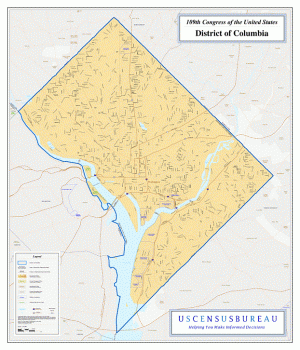The International Narcotics Control Board (INCB) issued its annual report on the global drug situation today, and it is very "concerned" about marijuana legalization. But its chorus of critics is growing larger and louder.
The District of Columbia city council has voted to decriminalize small-time marijuana possession. The mayor is expected to sign the bill, but Congress must still approve, too.
CBD medical marijuana bills are moving in states that have traditionally been unreceptive to medical marijuana, New Mexico moves to increase supply, Maryland promulgates draft rules, and more.
A major scandal envelopes five San Francisco police officers, a former Illinois probation officer heads for prison in the cocaine death of an Illinois judge, a Kentucky drug task force commander cops to ripping off his employers, and more.
A thousand people march in support of "El Chapo" Guzman in his home state, Alaska makes it official that legalization is on the August ballot, another poll has a majority for marijuana legalization, medical marijuana bills move in a pair of states, there are a pair of moves to tighten up on pain pills, and more.
Another state, another poll, more support for marijuana reform, plus a Good Samaritan 911 bill moves in Maryland, a welfare drug testing bill moves in Indiana, Minnesota takes a chagrined second look at its welfare drug testing law, Norway's conservatives have a hash scandal, Dutch cops warn against legalizing grows, and more.
DC should decriminalize tomorrow, New Mexico looks to expand its medical marijuana program, harm reduction bills move in a couple of states, Mexican police repress a pro-El Chapo demonstration, and more.
The INCB releases its annual drug report and so does the US State Department, DC moves toward marijuana decriminalization and so does New Hampshire, the Georgia House approves a CBD medical marijuana bill and so does the Utah House, and more.
Washington state's marijuana legalization passes a milestone, the DEA gets an earful on pot in Congress, the fight over Oregon's statewide dispensary regulation bill continues, pain pill prescriptions decrease, Indian poppy farmers are plagued by strung-out antelope, and more.
The global drug prohibition bureaucracy's watchdog group, the International Drug Control Board (INCB) released its Annual Report 2013 today, voicing its concerns with and wagging its finger at drug reform efforts that deviate from its interpretation of the international drug control treaties that birthed it. The INCB is "concerned" about moves toward marijuana legalization and warns about "the importance of universal implementation of international drug control treaties by all states."
"We deeply regret the developments at the state level in Colorado and Washington, in the United States, regarding the legalization of the recreational use of cannabis,"
INCB head Raymond
Yans said in introducing the report. "
INCB reiterates that these developments contravene the provisions of the drug control conventions, which limit the use of cannabis to medical and scientific use only.
INCB urges the Government of the United States to ensure that the treaties are fully implemented on the entirety of its territory."
For some years now, some European and Latin American countries have been expressing a desire to see change in the international system, and "soft defections," such as the Dutch cannabis coffee shop system and Spain's cannabis cultivation clubs, have stretched the prohibitionist treaties to their legal limits. But legal marijuana in Uruguay is a clear breach of the treaties, as Colorado and Washington may be. That is bringing matters to an unavoidable head.
After surveying the state of drug affairs around the globe, the 96-page INCB report ends with a number of concerns and recommendations, ranging from non-controversial items such as calling for adequate prevention and treatment efforts to urging greater attention to prescription drug abuse and more attention paid to new synthetic drugs. [Ed: There is some controversy over how to best approach prescription drug abuse and synthetic drugs. e.g. the type of attention to pay to them.]
But the INCB is clearly perturbed by the erosion of the international drug prohibition consensus, and especially by its concrete manifestations in legalization in Uruguay, Colorado, and Washington and the spreading acceptance of medical marijuana.
"The Board is concerned that a number of States that are parties to the 1961 Convention are considering legislative proposals intended to regulate the use of cannabis for purposes other than medical and scientific ones" and "urges all Governments and the international community to carefully consider the negative impact of such developments. In the Board's opinion, the likely increase in the abuse of cannabis will lead to increased public health costs," the report said.
Similarly, the INCB "noted with concern" Uruguay's marijuana legalization law, which "would not be in conformity with the international drug control treaties, particularly the 1961 Convention" and urged the government there "to ensure the country remains fully compliant with international law, which limits the use of narcotic drugs, including cannabis, exclusively to medical and scientific purposes."
Ditto for Colorado and Washington, where the board was "concerned" about the marijuana legalization initiatives and underlined that "such legislation is not in conformity with the international drug control treaties." The US government should "continue to ensure the full implementation of the international drug control treaties on its entire territory," INCB chided.
But even as INCB struggles to maintain the legal backbone of global prohibition, it is not only seeing marijuana prohibition crumble in Uruguay and the two American states, it is also itself coming under increasing attack as a symbol of a crumbling ancien regime that creates more harm than good with its adherence to prohibitionist, law enforcement-oriented approaches to the use and commerce in psychoactive substances.
"We are at a tipping point now as increasing numbers of nations realize that cannabis prohibition has failed to reduce its use, filled prisons with young people, increased violence and fueled the rise of organized crime," said Martin Jelsma of the Transnational Institute. "As nations like Uruguay pioneer new approaches, we need the UN to open up an honest dialogue on the strengths and weaknesses of the treaty system rather than close their eyes and indulge in blame games."
"For many years, countries have stretched the UN drug control conventions to their legal limits, particularly around the use of cannabis," agreed Dave Bewley-Taylor of the Global Drug Policy Observatory. "Now that the cracks have reached the point of treaty breach, we need a serious discussion about how to reform international drug conventions to better protect people's health, safety and human rights. Reform won't be easy, but the question facing the international community today is no longer whether there is a need to reassess and modernize the UN drug control system, but rather when and how."
"This is very much the same old stuff," said John Collins, coordinator of the London School of Economics IDEAS International Drug Policy Project and a PhD candidate studying mid-20th Century international drug control policy. "The INCB views its role as advocating a strict prohibitionist oriented set of policies at the international level and interpreting the international treaties as mandating this one-size-fits-all approach. It highlights that INCB, which was created as a technical body to monitor international flows of narcotics and report back to the UN Commission on Narcotic Drugs, has carved out and maintains a highly politicized role, far removed from its original treaty functions. This should be a cause for concern for all states interested in having a functioning, public health oriented and cooperative international framework for coordinating the global response to drug issues," Collins told the Chronicle.
"The INCB and its current president, Raymond Yans, take a very ideological view of this issue," Collins continued. "Yans attributes all the negative and unintended consequences of bad drug policies solely to drugs and suggests the way to lessen these problems is more of the same. Many of the policies the board advocates fly in the face of best-practice public health policy -- for example the board demanding that states close 'drug consumption rooms, facilities where addicts can abuse drugs,'" he noted.
"If the board was really concerned about the 'health and welfare' of global populations it would be advocating for these scientifically proven public health interventions. Instead it chooses the road of unscientific and ideological based policies," Collins argued.
The INCB's reliance on ideology-driven policy sometimes leads to grotesque results. There are more than 30 countries that apply the death penalty for drugs in violation of international law. Virtually every international human rights and drug control body opposes the death penalty for drugs including the United Nations Office on Drugs and Crime, the UN Human Rights Committee, the UN's human rights experts on extrajudicial killings, torture and health, among many others.

INCB head Raymond Yans (incb.org)
But when an
INCB board member was asked in Thailand -- where 14 people have been executed for drugs since 2001 -- what its position on capital punishment was, he said, "the agency says it neither supports nor opposes the death penalty for drug-related offenses," according to the
Bangkok Post.Human rights experts were horrified and immediately wrote asking for clarification, to which the INCB responded, "The determination of sanctions applicable to drug-related offenses remains the exclusive prerogative of each State and therefore lie beyond the mandate and powers which have been conferred upon the Board by the international community," according to Human Rights Watch.
Another area where the board's concern about the health and welfare of global populations is being challenged is access to pain medications. A key part of the INCB's portfolio is regulating opioid pain medications, and this year again it said there is more than enough opium available to satisfy current demand, although it also noted that "consumption of narcotic drugs for pain relief is concentrated within a limited number of countries."
The World Health Organization (WHO) agrees about that latter point. A 2011 study estimated that around 5.5 billion people -- or 83% of the world population -- live in countries with 'low to non-existent' access to opioid pain relief for conditions such as cancer and HIV/AIDS. These substances are listed by the WHO as essential medicines, and the international drug control conventions recognise explicitly that they are 'indispensable' to the 'health and welfare of mankind.'
Adding to the paradox -- the global supply is sufficient, but four-fifths of the world doesn't have access -- the INCB calls on governments to "ensure that internationally controlled substances used for pain relief are accessible to people who need them."
What is going on?
"The INCB uses totals of requirements for opioid medicines compiled by the UN treaty signatory states," said Ann Fordham, executive director of the International Drug Policy Consortium, which keeps an eye on the agency with its INCB Watch. "Unfortunately there is often a huge gap between these administrative estimates and the actual medical needs of their populations."
The prohibitionist slant of global drug control also creates a climate conducive to understating the actual need for access to pain relief in other ways, Fordham told the Chronicle.
"Many governments interpret the international drug control conventions in a more restrictive manner than is necessary, and focus their efforts towards preventing access to the unauthorized use of opioids rather than to ensuring their medical and scientific availability," she said. "This is a grossly unbalanced reading of the conventions, underpinned by fear and prejudice regarding opioids and addiction."
Although the agency has cooperated somewhat with the WHO in attempting to enhance access to the medicines, said Fordham, it bears some blame for rendering the issue so fraught.
"The INCB has continually stressed the repressive aspect of the international drug control regime in its annual reports and other public statements, and in its direct dealings with member states," she said. "The INCB is therefore responsible for at least some of the very anxieties that drive governments toward overly restrictive approaches. This ambivalence considerably weakens the INCB's credibility and contradicts its health-related advocacy."
Fordham joined the call for a fundamental reform of global drug prohibition, and she didn't mince words about the INCB.
"The entire UN drug control system needs to be rebalanced further in the direction of health rather than criminalization, and it is changing; the shift in various parts of the system is apparent already," she said before leveling a blast at Yans and company. "But the INCB is notable as the most hard line, backward-looking element, regularly overstepping its mandate in the strident and hectoring manner its adopts with parties to the treaties, in its interference in functions that properly belong to the WHO and in its quasi-religious approach to a narrow interpretation of the drug control treaties."
The INCB should get out of the way on marijuana and concentrate on its pain relief function, said Collins.
"The INCB should stay out if it," he said bluntly. "It is a technocratic monitoring body. It should not be involving itself in national politics and national regulatory systems. So it doesn't need to be either a help or hindrance on issues regarding cannabis reform. It has no reason to be involved in this debate. It should be focusing on ensuring access to essential pain medicines. These debates are a distraction from that core function and I would argue one of the reasons it is failing to meet this core function."
Sorry, INCB. Welcome to the 21st Century.
back to top
Washington, DC, is set to become the next entity to decriminalize small-time marijuana possession after the city council Tuesday gave final approval to a decriminalization bill. The bill must still be approved by Mayor Vincent Gray, who has signaled support for decriminalization.
But even after the mayor signs off, the measure will not become law until Congress has completed a required legislative review. That process could last into the summer.
The "Marijuana Possession Decriminalization Amendment Act of 2014" (Council Bill 20-409) removes the threat of arrests for the possession of less than an ounce and replaces it with a $25 fine, the lowest fine in any state that has decriminalized. In setting the fine so low, council members cited homelessness in the District and high poverty rates in areas of the city that have seen the highest numbers of arrests.
Police still can, however, seize your marijuana and whatever you used to smoke it. And public use of marijuana remains a criminal misdemeanor punishable by up to 60 days in jail.
"This is a big step forward for our nation's capital, as well as our nation as a whole. Clearly, marijuana prohibition's days are numbered in the United States," said Dan Riffle, director of federal policies for the Marijuana Policy Project, which supported the bill. "We should not be saddling people with criminal records simply for using a substance that is less harmful than alcohol," Riffle said. "Law enforcement resources should be used to address serious crimes, not to arrest and prosecute adults for possessing small amounts of marijuana. Neither the District nor any of the states can afford to continue criminalizing adults for marijuana possession."
"For far too long, people of color have been disproportionately and unfairly arrested and marginalized for marijuana possession in the District of Columbia. DC council members took the first critical step today toward ending the selective enforcement of marijuana prohibition policies that have perpetuated racial disparities in the criminal justice system for decades," said Grant Smith, policy manager with the Drug Policy Alliance, which also supported the bill.
"Council members heard the public's demand that marijuana arrests end and have passed model legislation that is one of the strongest marijuana decriminalization laws in the whole country," Smith continued. "Mayor Vincent Gray should sign and ensure this bill goes to Congress for its review without delay. With every day that passes, more District residents' lives are irrevocably harmed with these senseless marijuana possession arrests."
Passage of the decrim bill is by no means the end of pot politics in the District this year. Two other marijuana-related bills are still before the council, one (Council Bill 20-467) that would seal marijuana arrest and conviction records and one (Council Bill 20-466) that legalize, tax, and regulate marijuana commerce for adults.
And looming over the legislative activity is the DC marijuana legalization initiative, which is awaiting approval for signature-gathering from the Board of Elections.
back to top
CBD medical marijuana bills are moving in states that have traditionally been unreceptive to medical marijuana, New Mexico moves to increase supply, Maryland promulgates draft rules, and more. Let's get to it:
NationalOn Wednesday, marijuana foes urged the Justice Department not to reschedule marijuana, instead calling for more research. Project SAM, addiction-oriented medical groupings, and anti-drug groups sent a letter Wednesday to the Justice Department urging it to resist calls to reschedule marijuana and calling instead for easier access to marijuana for researchers. The signatories have "deep concern" about the "normalization" of marijuana and about "recent statements from members of Congress diminishing the harms and dangers of marijuana use."
California
Last Wednesday, Shasta County petitioners handed in more than 13,000 signatures, double the number required to force the county's pending ban on outdoor medical marijuana gardens onto the November ballot.
Florida
On Wednesday, a CBD medical marijuana passed a House Subcommittee vote. The "Charlotte's Web" bill (House Bill 843), named after a strain believed to reduce epileptic seizures, passed a subcommittee of the House Criminal Justice Committee and now awaits a full committee vote.
Georgia
On Monday, a CBD medical marijuana bill passed the House. The bill would make CBD cannabis oil available to treat certain seizure disorders. House Bill 885 now goes to the state Senate.
Iowa
On Sunday, a poll found solid majority support for medical marijuana in the Hawkeye State. The Iowa Poll had support at 59%. But support for general legalization was only at 28%. Medical marijuana bills introduced in the legislature in recent years have gone nowhere.
Maryland
Last Thursday, the Maryland Medical Marijuana Commission released proposed draft regulations for medical marijuana programs and growers. The commission is taking comments for one more week. The program is supposed to be ready for implementation by July 1.
Michigan
On Wednesday, a bill that would bar patients from growing or smoking in rental properties unless their landlord approves passed the Senate. The bill, Senate Bill 783, sponsored by Sen. Rick Jones (R-Grand Ledge), now heads to the House.
Minnesota
On Tuesday, a medical marijuana bill was approved by a House committee. House File 1818 passed the House Health and Human Services Policy Committee and now moves to the House Government Operations Committee, but faces opposition from law enforcement, which is demanding that marijuana be available only in pill, liquid, or vapor form.
New Mexico
Last Friday, the Department of Health announced it was taking steps to increase the supply of medical marijuana. It is proposing to increase the number of marijuana plants and seedlings that licensed, nonprofit producers can have and open the application process for more producers to become licensed. There are only 23 producers in the state now, but the number of patients is on the rise. After reviewing information about patients' weekly usage and purchases, officials concluded that the program's participants need more than 11,000 pounds of marijuana yearly. The problem: Producers were reporting harvests that would provide only about 2,200 pounds.Under the proposals announced Friday, producers would be able to boost their crop from a total of 150 plants and seedlings to as many as 150 mature plants and 300 seedlings. The state would also be looking to add another 12 producers to the list.
New York
On Monday, medical marijuana supporters launched a month-long campaign to get a bill passed. Patients, families, caregivers and healthcare providers gathered Monday in Albany to launch March for Compassion, a month of activities and events held around New York to demand the State Senate to past the Compassionate Care Act (Assembly Bill 6357/Senate Bill 4406) by April 1. The patients are living with cancer, multiple sclerosis, and other serious, debilitating medical conditions, and the families include parents of children who suffer from severe forms of epilepsy, such as Dravet's syndrome.
Oregon
On Wednesday, legislators were still struggling to find compromise on the bill to regulate dispensaries statewide. Legislators trying to get the statewide dispensary regulation bill, House Bill 1531, through the House have floated the idea of allowing localities to enact temporary moratoria of up to a year in a bid to win over cities and counties that have objected to having to allow dispensaries to operate. The bill has already passed the Senate without allowing localities to ban dispensaries, and bill sponsors have indicated they will not support a bill that allows bans. Stay tuned.
Utah
On Monday, a CBD medical marijuana bill passed the Utah House. The bill would make CBD cannabis oil available on a trial basis for children suffering seizure disorders. House Bill 105 passed on a 62-11 vote and now goes to the state Senate.
[For extensive information about the medical marijuana debate, presented in a neutral format, visit MedicalMarijuana.ProCon.org.]
back to top
A major scandal envelopes five San Francisco police officers, a former Illinois probation officer heads for prison in the cocaine death of an Illinois judge, a Kentucky drug task force commander cops to ripping off his employers, and more. Let's get to it:

pile-of-cash_152.jpg
In San Francisco,
five San Francisco police officers were indicted last Thursday on a host of federal charges, including constitutional-rights violations, extortion, lying in court and on police reports, and dealing drugs. The officers were all part of plainclothes investigation teams whose alleged misdeeds in searches conducted at single-room-occupancy hotels in the Mission district, the Tenderloin and on Sixth Street -- including searching rooms without warrants -- were captured on video discovered by the Public Defender's Office in 2011. They are
Sgt. Ian
Furminger, 47, of Pleasant Hill; Officer Edmond Robles, 46, of Danville; Officer
Arshad Razzak, 41, of San Francisco; Officer Richard
Yick, 37, of San Francisco; and Officer Raul Eric Elias, 44, of San Mateo. All have been suspended without pay.
In Ballston Spa, New York, a Saratoga County sheriff's deputy was arrested last Friday on drug charges. Deputy Charles Fuller, 46, went down in a sting after a snitch and an undercover FBI agent made a deal to buy a pound of cocaine from him. He is charged with attempting to aid and abet the possession with intent to distribute 500 grams or more of cocaine. If convicted, Fuller faces a maximum of 40 years in prison, and a $5,000,000 fine.
In Taft, California, a federal prison guard was arrested Tuesday on charges he was smuggling drugs and other contraband into the Taft Federal Facility. Ramon Cano is accused of selling meth, cocaine, and heroin to inmates, along with syringes. He went down in a sting after accepting 28 grams of meth and 28 grams of heroin from FBI undercover agents posing as drug dealers. He is charged with possession of meth and heroin with intent to distribute. He's out on bail.
In Belleville, Illinois, a former St. Clair County probation officer was sentenced last Thursday for his role in the death of St. Clair County Judge Joe Christ, who died last year of a cocaine overdose while on a fishing trip. James Fogarty, 46, was sentenced to five years in prison on cocaine distribution and firearms charges as part of a plea deal. Fogarty admitted selling cocaine to Christ and another judge the night before Chris died, but the state could not prove the cocaine he sold was responsible for Christ's death.
In Lexington, Kentucky, the former director of a drug task force pleaded guilty last Friday to stealing federal funds from the task force. Timothy George Fegan, 52, had run the Buffalo Trace/Gateway Narcotics Task Force and admitted taking cash proceeds that task force agents had seized during drug raids, as well as taking "buy money" on hand for undercover drug deals. The amount he stole will be determined during sentencing, which hasn't been set yet.
back to top
A thousand people march in support of "El Chapo" Guzman in his home state, Alaska makes it official that legalization is on the August ballot, another poll has a nationwide majority for marijuana legalization, medical marijuana bills move in a pair of states, there are a pair of moves to tighten up on pain pills, and more. Let's get to it:

Zohydro or No-hydro? A move is on to get the new hydrocodone-based pain medication killed.
Marijuana Policy
It's Official -- Alaska Lieutenant Governor Signs Off on Legalization Initiative. Alaska Lt. Gov. Mead Treadwell Wednesday made it official: Alaska will vote on a marijuana legalization initiative sponsored by the Campaign to Regulate Marijuana Like Alcohol in Alaska, which is working with the Marijuana Policy Project. "I have determined that the initiative sponsors have timely filed the petition and that the petition is signed by qualified voters… the Director of the Division of Elections shall place the ballot title and proposition on the election ballot for the Primary Election on August 19, 2014," Treadwell wrote in his official statement.
CBS News Poll Has Narrow Majority for Legalization, Strong Support for Medical Marijuana. Some 51% of Americans think marijuana should be legal, according to a new CBS News poll, and a whopping 86% think doctors should be able to prescribe it for medical use. Just three years ago, the CBS News poll had support for legalization at only 40%. CBS News now joins pollsters at Gallup, Pew Research, CNN,Quinnipiac, PPP, NBC News/Wall Street Journal, who have have all found that a majority of the country supports marijuana legalization.
Medical Marijuana
Georgia CBD Medical Marijuana Wins House Committee Vote. A bill that would allow for the use of CBD cannabis oil for children suffering epileptic seizures won a unanimous vote in the House Health and Human Services Committee Wednesday. House Bill 885 was approved after sponsor Rep. Allen Peake (R-Macon) amended it to allow for cultivation of marijuana at Georgia medical research universities. Producers of CBD cannabis oils cannot legally import them to Georgia.
Kentucky Medical Marijuana Bill Wins House Committee Vote. The Kentucky House Health and Welfare Committee approved a bill that would allow people suffering from conditions such as cancer, multiple sclerosis (MS), and HIV/AIDS to use medical marijuana by a vote of 9-5 today, following a public hearing. The Cannabis Compassion Act, or House Bill 350, introduced by Rep. Mary Lou Marzian (D-Louisville) and cosponsored by Committee Chairman Tom Burch (D-Louisville), would permit licensed patients and caregivers to possess and cultivate limited amounts of marijuana, and it would establish regulations to operate a limited number of medical marijuana compassion centers and testing facilities.
Drug Courts
New Jersey Governor Wants $4.5 Million for Drug Court Expansion. New Jersey Gov. Chris Christie (R) announced Wednesday that his proposed 2015 budget includes $4.5 million to pay for an expansion of the state's drug court program, but the sponsor of the bill that created the expansion says that isn't enough. The budget also includes half a million dollars to help provide drug offenders with employment services and another half million to allow drug court clients to obtain job training, skills acquisition, and job placement. But critics said if the state wants to provide drug treatment, it should do so without forcing people into drug court. "If you're really going to talk about the shift from addiction to treatment, it's not just for those who get arrested," said Roseanne Scotti, the director of the Drug Policy Alliance New Jersey office.
Opioid Pain Medications
Coalition Calls on FDA to Reverse Approval of Zohydro. Zohydro, a hydrocodone-based opioid pain reliever, was approved by the FDA last fall, but now a coalition of drug treatment, healthcare, and consumer groups led by Physicians for Responsible Opioid Prescribing is calling on the agency to reverse that decision. "It's a whopping dose of hydrocodone packed in an easy-to-crush capsule," said the group's Dr. Andrew Kolodny. "It will kill people as soon as it's released." But Zogenix, Zohydro's manufacturer, and the FDA both insist that the drug's benefits outweigh its risks.
DEA Publishes Proposal to Move Hydrocodone Combo Products to More Restrictive Schedule II. The DEA today published in the Federal Register notice that it intends to reschedule the opioid pain reliever hydrocodone from Schedule III to Schedule II, making it more difficult to access, when it is sold in products that also contain substances, such as aspirin or acetaminophen. Hydrocodone by itself is already Schedule II, but Congress placed the combination products in Schedule III when it passed the Controlled Substances Act in 1970. The DEA says Schedule III opioids are more likely to be abused than the more tightly controlled Schedule II ones. Public comment on the proposed rule must be made by April 27 and can be done at www.regulations.gov. A request for a hearing can be made at the same web site, but the deadline for that is March 31.
Sentencing
Sentencing Discrepancies Under Scrutiny in Minnesota. Widespread disparities in Minnesota drug sentencing revealed in a Minneapolis Star Tribune story Sunday led to a legislative hearing Wednesday in which legislators offered up fixes ranging from stiffer sentences for drug "kingpins" to lesser penalties for low-level drug offenders. But even though Minnesota has tougher drug sentences that surrounding states, increased penalties appeared to have more traction than decreased ones.
International
A Thousand March for "El Chapo" Guzman in Culiacan. More than a thousand people marched through the streets of Culiacan, the capital of Sinaloa, in support of captured Sinaloa Cartel leader Joaquin "El Chapo" Guzman Wednesday. The largely young crowd, many dressed in white, bore signs that read "We want Chapo Freed" and "We demand no extradition" as they filed across the center of Culiacan.
Bermuda Activist Challenges Bias of Speaker Chosen By Government to Address Medical Professionals. Attorney Alan Gordon, one of Bermuda's most prominent marijuana activists, is raising concerns about the government's selection of Dr. Andrea Barthwell to address medical professionals there. Barthwell, a former deputy drug czar under George W. Bush, has "a long history of credible accusations" made against her "one-sided and heavily misleading information which could harm Bermuda health care," Gordon said. "Dr. Barthwell's bias against medical cannabis, historically, is so strong that she is not a credible source of information until she meaningfully addresses the allegations," said Gordon. He had a lot more to say about Barthwell, too. Click on the link to read it all.
back to top
Another state, another poll, more support for marijuana reform, plus a Good Samaritan 911 bill moves in Maryland, a welfare drug testing bill moves in Indiana, Minnesota takes a chagrined second look at its welfare drug testing law, Norway's conservatives have a hash scandal, Dutch cops warn against legalizing grows, and more. Let's get to it:

Dutch police oppose legalizing the supply of marijuana to the country's famous cannabis cafes. (wikimedia.org)
Pennsylvania Poll Finds Near Majority for Legalization, Supermajority for Medical Marijuana. A Mercyhurst Center for Applied Politics (MCAP) poll released Friday has support for marijuana legalization in the Keystone State at 48%, with 42% opposed. A solid majority, 59%, supported decriminalization. On medical marijuana, a whopping 85% believe patients should be allowed to use it when prescribed by a doctor. "Our findings suggest that the position of Pennsylvanians on the legalization of marijuana is largely consistent with the nation as a whole," MCAP Director Joseph Morris said in a statement.
Medical Marijuana
Oregon Dispensary Applications Start Monday. The Oregon Medical Marijuana Dispensary Program will begin taking applications for a dispensary license Monday. Click on the link to go the Oregon Health Authority's relevant pages.
Maryland Draft Regulations for Medical Marijuana Programs Released. The Maryland Medical Marijuana Commission has released its proposed regulations for medical marijuana programs and growers. The commission is looking for comments, and interested parties have two weeks to get them in. Click the link to read the draft regs.
Drug Policy
Drug Reform Journalist Dean Becker Publishes Book to End the Drug War. And it's called To End the War on Drugs. Becker is the man behind the Houston-based Drug Truth Network, where he has hosted more than a thousand Pacifica Radio programs going out to 90 affiliates and interviewed just about everybody is who is anybody in the world of drug reform (and many of the opposition, too). It's available as a paperback or e-book; click on the title link for all the details.
Drug Testing
Minnesota Revisiting Much Criticized Felon Welfare Drug Testing Law. A law that went into effect last year requiring counties to determine which welfare applicants had felony drug convictions and subject them to drug tests to qualify for benefits would be changed under a bill heard Tuesday by the House Health and Human Services Policy Committee. House File 1987, introduced by Rep. Rena Moran (DFL-St. Paul), would make participation by counties optional. Counties and welfare rights and civil liberties advocates have argued that the law is a costly unfunded mandate that has little real world effect because the number of people who test positive for drugs under it is miniscule. The committee held the bill for possible inclusion in an omnibus bill. A similar measure awaits action in the Senate.
Welfare Drug Testing Bill Advances in Indiana. A bill that would require welfare recipients previously convicted of a drug crime to pass a drug test before receiving benefits passed the Senate Appropriations Committee Thursday. House Bill 1351 has already passed the House and another Senate committee and now heads for a floor vote.
No Link Found Between Positive Tests for Marijuana and Work-Related Accidents. Past marijuana smoking, as indicated by the presence of inert metabolite in standard urine tests, is not associated with work-related accidents, according to a new study published in the Journal of Addictive Diseases. "This study fell short of finding an association between marijuana use and involvement of workplace accidents," the author concluded. He added, "This study cannot be taken as definitive evidence of absence of an association between marijuana and work related accidents but the findings are compelling."
Harm Reduction
Maryland Good Samaritan 911 Bill Passes House. A bill that would provide limited immunity for anyone seeking medical assistance for a potential overdose victim unanimously passed the Maryland House of Delegates Thursday. Passage of House Bill 416 would mean that no person can be charged with possession of drugs or alcohol, or violation of an outstanding non-violent arrest warrant, if police or emergency personnel are called to administer aid to an overdose victim. This applies to the individual overdosing and a friend or bystander calling on the victim's behalf. The bill now moves to the Senate.
International
Mexican Vigilantes Take Cartel Fight to Key Port. Vigilante groups that emerged in the western state of Michoacan to fight off the grip of the Knights Templar drug trafficking organization have now moved to the outskirts of the key Pacific port city of Lazaro Cardenas. The move comes as the Mexican government attempts to integrate the vigilantes into a military-controlled Rural Defense Force. The groups first sprang up a year ago, when state and local authorities proved ineffective against the cartel, and now, they and the military have driven the Knights out of a number of Michoacan communities.
Dutch Police Fear "Extreme Violence" if Marijuana Cultivation is Legalized. The Dutch National Police have come out against legalizing marijuana cultivation because they fear criminals will attack the pot farms with "extreme violence," according to a letter to regional governments from Deputy Chief Constable Ruud Blik. Mayors of more than 50 cities had recently called for growing to be legalized, and the Heerlen Mayor Paul Depla found himself "bewildered" and "disconcerted" by Blik's remarks. "We want to take marijuana cultivation out of the criminals' hands with legal plantations. But the National police says: no, we're not doing that, because then criminals threaten to rip our plantations. Out of fear of reprisals we do nothing, then, and leave the marijuana cultivation in the hands of criminals. That is an upside down world, and unworthy of the rule of law," Depla said.
Hash Smoking Scandal for Norway's "Zero Tolerance" Conservative Government. A Norwegian politician with links to the prime minister in Norway's new conservative coalition government has admitted smoking hashish "on one occasion," embarrassing the government, which campaigned on "zero tolerance" drug policies. To make matters worse, one-time toker and alternative MP Erik Skutle then spoke out against the policy, saying marijuana should be sold in pharmacies in state-owned shops. "I think we have a better chance of controlling and reducing consumption if we sell them over the counter, rather than having a total ban," he said.
British Drug Minister Will Ask China and India to Crack Down on New Synthetic Drugs. British drug minister Norman Baker said after a Home Office summit on "legal highs" that he would approach the Chinese and Indian governments in a bid to curb new synthetic drugs not covered by existing drug laws. Baker said he hoped to have "frank and honest" discussions about curbing the illicit laboratories' activities with source countries such as China and India at next month's meeting of the UN Commission on Narcotic Drugs. While Britain and other countries have moved to quickly ban new synthetics, New Zealand has instead chosen to regulate them.
back to top
DC should decriminalize tomorrow, New Mexico looks to expand its medical marijuana program, harm reduction bills move in a couple of states, Mexican police repress a pro-El Chapo demonstration, and more. Let's get to it:

The shrine to narco-saint Jesus Malverde in Culiacan. (Phil Smith, Drug War Chronicle, 2008)
DC Decriminalization Bill Expected to Get Final Vote Tomorrow. The District of Columbia city council is expected to give final approval tomorrow to a bill that would decriminalize the possession of up to an ounce of weed, with a $25 fine. It has the support of eight of 13 council members, so it should be a done deal, but stay tuned tomorrow.
Legalization Bill Introduced in Florida. State Sen. Dwight Bullard (D-Orlando) has introduced a legalization bill in the Sunshine State. Senate Bill 1562 was filed Friday. The proposal comes as Florida voters prepare to cast ballots in November on legalizing medical marijuana. Also, lawmakers are considering proposals to legalize a marijuana extract that can help some children who have a form of epilepsy and suffer from severe seizures.
Medical Marijuana
California Statewide Regulation Bill Has Support of Cops, Cities. For the first time, California law enforcement and local government associations are backing legislation to regulate the medical marijuana industry. The California Police Chiefs Association and the League of California cities are supporting Senate Bill 1262, filed by Sen. Lou Correa (D-Santa Ana), but the bill is opposed by friends of medical marijuana, who object to its provisions setting limits on doctors who recommend it.
New Jersey Annual Medical Marijuana Reports Out. The state Department of Health has released the 2013 Annual Report and the 2013 Biennial Report on the status of the state's medical marijuana program. The state has 1,585 active registered patients, 121 active registered caregivers, and six registered dispensaries. Both reports are at the link.
Massachusetts Caregiver Flouts Regs, Grows for More than One Patient. Longtime Bay State marijuana activist Bill Downing has gone public with his flouting of the state's medical marijuana regulations. He says he is providing medical marijuana to some 350 patients, but state regulations say he can be a caregiver for only one. Downing says it's the regulations that are in conflict with the state's medical marijuana law, not him. "The regulation violates the statute. The statute allows for caregiving. The regulation does not," he said. And the state Health Department knows what he is up to, he added.
New Mexico to Address Medical Marijuana Shortage, Adds New Conditions. Acknowledging that a shortage of medical marijuana exists in the state, the Department of Health Friday proposed increasing the number of plants and seedlings that licensed producers can grow and opening the application process to allow more producers to apply for licenses. There are only 23 licensed producers in the state, and demand is rising. Under the proposals announced Friday, producers would be able to boost their crop from a total of 150 plants and seedlings to as many as 150 mature plants and 300 seedlings. The state would also be looking to add another 12 producers to the list. The number of patients in the state jumped to more than 10,000 last year, an increase of 1,200 over the previous year. The department also announced it was adding Parkinson's and Huntington's diseases to the list of qualifying conditions to get into the program.
Solid Majority Favors Medical Marijuana in Iowa Poll. Nearly six out of 10 Iowans (59%) support legalizing medical marijuana, according to the latest Iowa Poll. But only 28% support legalization. Medical marijuana bills are introduced in the legislature every year, but have yet to go anywhere.
Harm Reduction
Overdose Reversal Drug Bill Moving in Ohio. A bill that would expand access to the opiate overdose reversal drug naloxone (Narcan) remains alive after the House voted to concur in changes made to it in the Senate. Substitute House Bill 170, sponsored by Rep. Terry Boose (R-Norwalk) has an emergency clause and will go into effect immediately upon signature by Gov. John Kasich (R).
Good Samaritan 911 Bill Moving in Georgia. A bill that would provide limited immunity from prosecution on drug charges for people who seek emergency treatment for drug overdose victims has passed the House. House Bill 965, also known as the Georgia 911 Medical Amnesty Law, now awaits action in the Senate.
Asset Forfeiture
Asset Forfeiture Reporting Bill Gets Hearing in Maryland. A bill that would require police to report the type of property seized, the crime with which it is supposedly linked, and the disposition of any related criminal cases has been heard in the Maryland Senate. Senate Bill 468, sponsored by Sen. Christopher Shank (R-Washington County), got a hearing last week in the Senate Judicial Proceedings Committee, but no vote was taken.
International
Mexican Police Arrest 40 in Pro-El Chapo Guzman Demonstration in Culiacan. Police in Culiacan, Sinaloa, arrested about 40 people Sunday who were planning to demonstrate in support of captured Sinaloa Cartel leader Joaquin "El Chapo" Guzman. About 150 supporters had gathered at the shrine to Jesus Malverde, informal patron saint of drug traffickers, in Culiacan, and about 40 were arrested when they refused to disperse. Some shouted "Long live Chapo." More than a thousand people marched for Guzman in Culiacan last week, and police wanted to prevent a repeat of signs of public support.
Drug Reformers Head to New Zealand for Conference on Regulating Legal Highs. Drug reformers from around the globe are heading to Auckland later this month to discuss the Psychoactive Substances Act and advocate further drug reform. The Pathway to Reform conference will take place on March 20.
Conservative Norwegian MP Charged in Hash Scandal Case. Erik Skutle, the Conservative Party member of parliament who took Prime Minister Erna Solberg's seat when she took the leadership position, has been charged with hashish use in a case that has embarrassed his "zero tolerance" political party. He was charged Thursday, a day after he publicly proposed decriminalizing cannabis possession as the scandal emerged. But it looks like he will retain his seat in parliament.
back to top
The INCB releases its annual drug report and so does the US State Department, DC moves toward marijuana decriminalization and so does New Hampshire, the Georgia House approves a CBD medical marijuana bill and so does the Utah House, and more. Let's get to it:
Marijuana PolicyDC City Council Approves Marijuana Decriminalization. The District of Columbia city council Tuesday voted 10-1 to give final approval to a marijuana decriminalization bill. It must still be signed by the mayor and approved by Congress. The "Marijuana Possession Decriminalization Amendment Act of 2014" (Council Bill 20-409) removes the threat of arrests for the possession of less than an ounce and replaces it with a $25 fine, the lowest fine in any state that has decriminalized.
New Hampshire House Committee Approves Decriminalization Bill. The New Hampshire House Criminal Justice and Public Safety Committee approved a decriminalization bill Tuesday. House Bill 1625 would allow for the possession of up to an ounce. It would also make the cultivation of up to six plants a misdemeanor.
Oklahoma City Marijuana Decriminalization Initiative Ready to Get Underway. Signature gathering will begin Friday for an Oklahoma City municipal initiative that would decriminalize small-time pot possession. Advocates filed the measure Monday. They have 90 days to gather some 6,200 valid voter signatures to put the measure on the ballot in the next municipal election. Click on the link to see the initiative.
Pennsylvanians Evenly Split on Legalization, Favor Medical Marijuana, Poll Finds. A new Quinnipiac poll has support for legalization at 48%, with 49% opposed. Medical marijuana is favored by 85%.
Northeastern NAACP Chapters Endorse Rhode Island Legalization.The New England Area Conference of the NAACP, comprising chapters in Rhode Island, Massachusetts, Vermont, New Hampshire and Maine, is supporting legislation to legalize marijuana in Rhode Island. Among other reasons, the NAACP cited "an alarming racial disparity" in marijuana arrests.
Medical Marijuana
Georgia House Approves CBD Medical Marijuana Bill. The Georgia House Monday overwhelmingly approved a bill to make CBD cannabis oil available to treat certain seizure disorders. House Bill 885 now goes to the state Senate.
Utah House Approves CBD Medical Marijuana Bill. The Utah House Monday approved a bill to make CBD cannabis oil available on a trial basis for children suffering seizure disorders. House Bill 105 passed on a 62-11 vote and now goes to the state Senate.
Drug Testing
Georgia House Approves Welfare Drug Testing Bill. The Georgia House Monday approved a bill that would require food stamp and welfare recipients to submit to drug testing if a state caseworker suspects they are using drugs. A positive drug test would result in a loss of benefits. House Bill 772, sponsored by Rep. Greg Morris (R-Vidalia) now goes to the state Senate.
Indiana Senate Committee Amends, Then Approves Welfare Drug Testing Bill. The Indiana Senate Health Committee Monday approved a welfare drug testing bill, but only after amending it so that it only applies to recipients with previous drug convictions. Senate Bill 287 now heads to the Senate floor.
Prescription Drugs
Oklahoma House Approves Bill Adding Prescription Drugs to Drug Trafficking Statute. The Oklahoma House Monday unanimously approved a bill that would make people carrying large quantities of specified prescription drugs subject to drug trafficking charges. The bill adds morphine, oxycodone, hydrocodone, and benzodiazepine to the list of drugs in the trafficking statute. People possessing more than specified amounts of those drugs could face prison time and Senate.
International
International Narcotics Control Board Releases Annual Report, Frets About Marijuana Legalization. The INCB is very "concerned" about moves to legalize marijuana in US states and Uruguay. But the UN agency is also coming under serious attack from critics over what they call its ideologically-based positions. Click on the link for access to the report and to read our feature article on it and the critics.
State Department Releases Annual International Narcotics Control Strategy Report. Click on the link to read the report.
back to top
Washington state's marijuana legalization passes a milestone, the DEA gets an earful on pot in Congress, the fight over Oregon's statewide dispensary regulation bill continues, pain pill prescriptions decrease, Indian poppy farmers are plagued by strung-out antelope, and more. Let's get to it:

"Hey, buddy, know where I can score?" Opium-addicted nilgai are wrecking Indian poppy crops. (wikimedia.org)
Lawmakers Take on DEA Over Marijuana in Congressional Committee Hearing. DEA official Thomas Harrigan was on the hot seat at a hearing of the House Government Oversight Committee Tuesday. "There are no sound scientific, economic or social reasons to change our nation's marijuana policy," Harrigan told loudly skeptical lawmakers, even though he could not point to one death caused by marijuana. Congressmen Earl Blumenauer (D-OR) and Steve Cohen (D-TN) were among those who raked Harrigan over the coals. Click on the link for more.
First Ever Marijuana Producer License in Washington Granted in Spokane. The Washington State Liquor Control Board has granted the first license to grow marijuana for the state's legal pot market. The honor goes to Kouchlock Productions of Spokane, owned by Sean Green, who also owns dispensaries in Spokane and Seattle.
Oregon Bill to Put Legalization on November Ballot Dead in Senate. The Oregon legislature will not act to put marijuana legalization before the voters in November. A bill to do so, Senate Bill 1556, sponsored by Sen. Floyd Prozanski (D-Portland), doesn't have the votes to pass the Senate and faces near certain death in committee, lawmakers said Tuesday. That means if Oregon wants to legalize it this year, it will have to happen through the citizen initiative process.
North Carolina Poll Has Slight Majority Opposing Legalization. A new Elon Poll has 51% of North Carolinians opposed to marijuana legalization, with 39% in favor. The only demographic group to support legalization was young people. Among the 18-to-30 group, 54% said legalize it.
Medical Marijuana
Marijuana Foes Urge Justice Department Not to Reschedule, Call for More Research. Project SAM, addiction-oriented medical groupings, and anti-drug groups sent a letter Wednesday to the Justice Department urging it to resist calls to reschedule marijuana and calling instead for easier access to marijuana for researchers. The signatories have "deep concern" about the "normalization" of marijuana and about "recent statements from members of Congress diminishing the harms and dangers of marijuana use."
Minnesota Medical Marijuana Bill Wins House Committee Vote. The House Health and Human Services Committee advanced a medical marijuana bill Tuesday. House File 1818 now moves to the House Government Operations Committee, but faces opposition from law enforcement, which is demanding that marijuana be available only in pill, liquid, or vapor form.
Compromise on Oregon Dispensary Regulation Bill Would Allow Only Temporary Local Bans. Legislators trying to get the statewide dispensary regulation bill, House Bill 1531, through the House have floated the idea of allowing localities to enact temporary moratoria of up to a year in a bid to win over cities and counties that have objected to having to allow dispensaries to operate. The bill has already passed the Senate without allowing localities to ban dispensaries, and bill sponsors have indicated they will not support a bill that allows bans. Stay tuned.
Michigan Senate Passes Medical Marijuana Restriction Bill. A bill that would prohibit medical marijuana users from growing or smoking their medicine in rental properties, including apartments and hotels, passed the Senate Tuesday. Senate Bill 783, sponsored by Sen. Rick Jones (R-Grand Ledge), allows landlords to ban such activities in leases. The bill now heads to the House.
Hemp
Nebraska Hemp Bill Passes Senate. A bill to allow the production, sale, and purchase of industrial hemp overwhelmingly passed the Senate Tuesday. Legislative Bill 1001 passed on a vote of 32-1. The bill is sponsored by Sen. Norm Wallman (D-Cortland). It now goes to the House.
Drug Testing
Florida Bill to Drug Test Politicians Filed. State Rep. Dane Eagle (R-Cape Coral) has filed a bill to require drug testing for judges and elected officials. The bill, House Bill 1435, is intended to "ensure that public officers are sober as they undertake their responsibility to make policy decisions that affect the health, safety and welfare of the citizens they represent." But similar laws have been struck down as unconstitutional in the federal courts.
Prescription Drugs
Opioid Prescriptions Decrease. Doctors and healthcare providers wrote approximately 11 million fewer prescriptions for narcotic painkillers in 2013 than in 2012. They wrote about 230 million prescriptions for opioids such as Vicodin, OxyContin and Percocet in 2013 according to data from IMS Health, a drug market research firm. That's down about 5% from 2012, when about 241 million prescriptions were written.
Synthetic Drugs
Kentucky Bill Would Up Penalties for Synthetic Drugs. State Rep. Ben Waide (R-Madisonville) Tuesday introduced a bill to increase the penalties for possession and trafficking of synthetic drugs. House Bill 495 would reduce the weights of synthetic drugs that trigger trafficking charges and would shift a first offense from a misdemeanor to a felony.
International
Indian Villagers Want Leopards Returned to Protect Legal Opium Crops From Strung-Out Antelope. Poppy farmers in Madhya Pradesh's opium belt want leopards returned to their area because, in their absence, opium-addicted nilgai (antelope) are wreaking havoc with their crops. The district had two leopards until 2008, but they were removed after farmers complained they feared for their lives. But since then, the population of nilgai has skyrocketed, fearlessly attacking poppy crops, and now the villagers want the big cats back. "Our opium fields were safe as long as leopard was here," said one. [Ed: Note that India including the Madhya Pradesh province is one of the countries providing licit opium growing for the global medicinal market.]
Mexican Vigilantes Demand Resignation of Apatzingan Mayor. Vigilantes opposed to the presence of the Knights Templar Cartel in the western state of Michoacan took over city hall in Apatazingan, a city of 100,000, Monday and demanded the resignation of the mayor, who they say is allied with the cartel. The vigilantes had entered the city three weeks ago, but pulled back to the outskirts and set up checkpoints to prevent cartel members and supporters from entering. The vigilantes are allied with Mexican security forces, who are attempting to absorb them as Rural Defense Forces.
back to top








